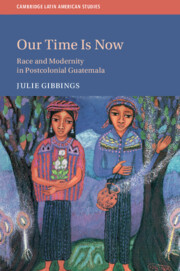Book contents
- Our Time Is Now
- Cambridge Latin American Studies
- Our Time Is Now
- Copyright page
- Dedication
- Contents
- Maps, Figures, and Tables
- Acknowledgments
- Introduction
- Part I Translating Modernities
- Part II Aspirations and Anxieties of Unfulfilled Modernities
- 5 On the Throne of Minerva
- 6 Freedom of the Indian
- 7 Possessing Tezulutlán
- 8 Now Owners of Our Land
- Conclusion
- Glossary
- Index
- Cambridge Latin American Studies (continue from page ii)
8 - Now Owners of Our Land
Nationalism, History, and Memory in Revolution, 1939–1954
from Part II - Aspirations and Anxieties of Unfulfilled Modernities
Published online by Cambridge University Press: 01 July 2020
- Our Time Is Now
- Cambridge Latin American Studies
- Our Time Is Now
- Copyright page
- Dedication
- Contents
- Maps, Figures, and Tables
- Acknowledgments
- Introduction
- Part I Translating Modernities
- Part II Aspirations and Anxieties of Unfulfilled Modernities
- 5 On the Throne of Minerva
- 6 Freedom of the Indian
- 7 Possessing Tezulutlán
- 8 Now Owners of Our Land
- Conclusion
- Glossary
- Index
- Cambridge Latin American Studies (continue from page ii)
Summary
By the time that World War II reached full force, Altaverapacence anti-imperialist nationalisms found further expression in anti-fascism, helping to overthrow Ubico and inaugurate Guatemala’s famed “ten years of spring.” This final chapter illustrates how Guatemala’s entrance into World War II, the nationalization of German properties, and the internment of German citizens ruptured power relations both regionally and nationally, while also generating expectations for land redistribution among rural workers and peasants. Alta Verapaz thus reveals how Guatemala’s 1952 agrarian reform was shaped by the events of World War II. Struggles over Guatemala’s 1952 agrarian reform condensed nineteenth-century histories of landownership and use, violent dispossessions, coerced labor, and disinheritance into bureaucratic struggles over what counted as unproductive and productive land use.
Keywords
- Type
- Chapter
- Information
- Our Time is NowRace and Modernity in Postcolonial Guatemala, pp. 311 - 356Publisher: Cambridge University PressPrint publication year: 2020

